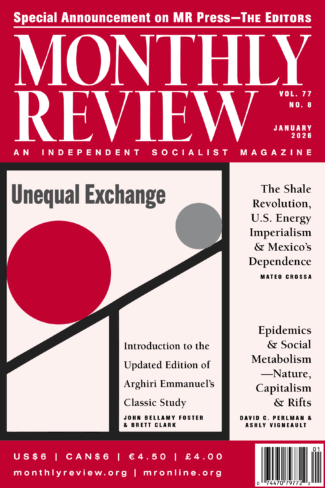February 1, 2026
Frederick Engels's
The Condition of the Working Class in England…has long been regarded by historians as the most systematic and thoroughgoing analysis of the deplorable conditions of the industrial working class in early Victorian England available from the times. Nevertheless, given the role that Engels's book played in the development of historical materialism, there have been continual attempts in the reigning ideology to prove his analysis wrong, all of which have failed dismally.
January 1, 2026
This month's "Notes from the Editors" celebrates the accomplishments of Michael Yates, who is retiring as editorial director of Monthly Review Press. Michael's books and articles have had a tremendous impact on the work of Monthly Review as a whole, and will be sorely missed. The editors also welcome the new editorial director of the Press, Arun Kundnani, an accomplished scholar who promises to carry on the MR tradition while bringing a fresh perspective to our collective efforts.
December 1, 2025
As part of our special issue on the legacy of former
MR coeditor Robert W. McChesney, December's "Notes from the Editors" revisits his prescient insight into the rise of neofascism in the U.S. While the threat is undeniable, he wrote, "the good news…is that there is nothing inexorable about the victory of fascism. There is another road out, and that road is socialism."
November 1, 2025
It is a commonplace that the world in the first quarter of the twenty-first century is facing multiple, multifaceted crises, threatening all world civilization and the future of humanity itself. So omnipresent is the contemporary world disorder that received ideology has settled on a single word to describe it: “polycrisis.” Anyone who wants to know what polycrisis is and where it comes from will inevitably run up against a blank wall. For the establishment, the vacuousness of the concept of polycrisis is its primary value.
October 1, 2025
In this month's "Note from the Editors,"
MR editors detail importance of understanding the world's grossly unequal carbon emissions output in terms of class while also recognizing the role of imperialism at the center of the crisis. "The rapidly worsening climate conditions threatening the world population," they write, "can thus be seen as a product of the ongoing
class war perpetuated by the 'billionaire class' against working people everywhere."
September 1, 2025
In order to understand the crisis of the imperialist world system in the twenty-first century,"
MR editors write in this month's "Notes from the Editors," "it is crucial to see this in terms of the
present as history, that is, as an outgrowth of a centuries-long historical process." Following this thread from the long sixteenth century through to the present day, the editors dissect the material conditions leading the emergence to a new and decidedly anti-imperialist revolutionary subject.
July 1, 2025
This month's "Notes from the Editors" discusses the accelerating progress of China toward sustainability. China's decline in carbon emissions and rapidly decarbonizing energy sector demonstrates the importance of societal realignment and extensive planning to shift toward the ecological modernization that has continued to elude monopoly-capitalist regimes.
June 1, 2025
This month, the editors dive into the history of Nazi Germany for a discussion of
Gleichschaltung, which in this instance describes the "falling into line" of institutions and individuals under fascism. As the editors point out, the extralegal and norm-breaking actions may be justified rhetorically by the fascist regime but require the acquiescence of the larger society in order to become effective—a process we are currently watching in real time.
May 1, 2025
In the Notes from the Editors,
MR editors dissect the true meaning behind the right-wing obsession with "Cultural Marxism" and its use to justify the right-wing takeover of the administrative state and the spread of the New McCarthyism threatening all those who oppose the administration. However, the editors point out, what the right fears is not a culturally based, postmodern approach to Marxism, but Marxism as it is historically and materially grounded and its true potential for building a proletarian movement against fascism.
April 1, 2025
This month,
MR editors take on the Sveriges Riksbank Prize in Economic Sciences in Memory of Alfred Nobel, a pale imitation of the five authentic Nobel Prizes that is aimed at reinforcing the ideology of neoclassical economics and awarded to mainstream liberal economists who defend the institutions of capitalism. In line with this tradition, the editors note, the most recent winners are keen apologists for settler colonialism and Zionism.










